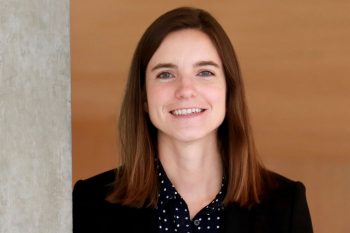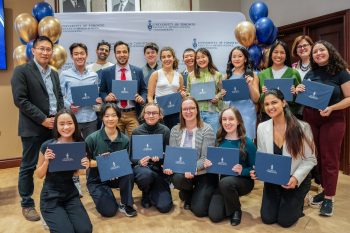Professor Shai Cohen recently joined the Institute for Studies in Transdisciplinary Engineering Education and Practice (ISTEP) as a faculty member. Cohen is a recognizable face for many U of T students and alumni, having taught in the Department of Mathematics, Computer Science, Rotman School of Management, and U of T Engineering, over the last 25 years.
“My first experience at U of T Engineering was when a professor blew out a ligament just a few days before the start of term. I was brought into the undergraduate chair’s office and asked if I wanted to teach a course that began in four days,” says Cohen. The following year, after another unforeseen circumstance, Cohen ended up teaching all four sections of a calculus course by himself.
“Somehow, teaching in Engineering always presents me with fascinating challenges, and it has been exhausting and delightful.”
Writer Liz Do spoke with Cohen to learn more about his teaching style and his goals as a new member of ISTEP.
Why did you choose to join ISTEP at U of T Engineering?
ISTEP was the natural place for me within the Faculty. I have taught every one of the first-year math courses for the Core 8 and Track One students. For several years, I have been working on improving the way we teach math to our students and the supports that we have for them to catch up on their studies. This is the best place for me to work with others who also focus on reaching multiple disciplines.
How would you describe your teaching philosophy?
The main idea behind it is that I believe in simultaneously challenging the students to perform at a level they did not think they could reach while supporting them in doing so. Throughout my career, I have seen how far students can go when no one tells them that they can’t, so I am aware that they can be driven to some remarkable achievements.
On the other hand, they also need to be given the tools to overcome any obstacles that lie in their path, whether it’s gaps in their foundational knowledge, learning disabilities, problems at home, or any other non-course related issue.
What do you hope to accomplish as an educator this term?
It’s the lockdown year, so I would be ecstatic with just getting my classes to the end of the term unscathed. I’ve been comparing this year to being a ship in a hurricane — the pilot in Joseph Conrad’s Typhoon comes to mind — we’re not aiming at any specific port; we’re just trying to stay afloat.
My biggest concern is my MAT 186T class, which is for students who dropped out of or failed calculus in the first semester. Fostering a sense of community and mutual support for this group will be a tall order, but absolutely essential.
What are your long-term plans or goals as an ISTEP faculty member?
I am looking to improve the way we teach mathematics for engineers. We are very good at teaching math and very good at teaching engineers. But putting these two things together — creating lessons that demonstrate mathematical principles in use with engineering concepts in a way that teaches both, getting instructors who are not trained in applied science to understand and teach these, and getting students to realize the use of such exercises — this is where I believe we should move in terms of our courses.
What are three things U of T Engineering students should know about you?
While I play an engineer on YouTube, where we have 500 videos for the online calculus courses, I do not have any formal training: just decades of watching my engineer father fixing things around the house and learning, from his creative cursing, the value of good design.
A lot of the students learn this eventually, but not enough: they can always ask me questions without having to be intimidated. It often seems like the biggest barrier for students to come to office hours is that the students are worried that I will “judge” them. Holding my hours in Sandford Fleming Atrium (before the pandemic) has certainly helped, but there are plenty of students who never show up to ask anything but should.
I’m almost never without a book nearby. If any student is looking for recommendations for reading material, I stand at the ready to give out a couple of dozen recommendations at the drop of a hat.



